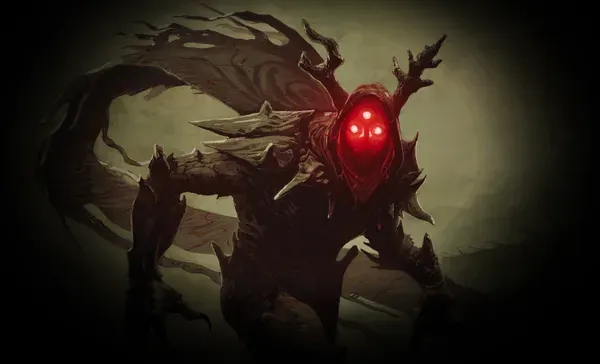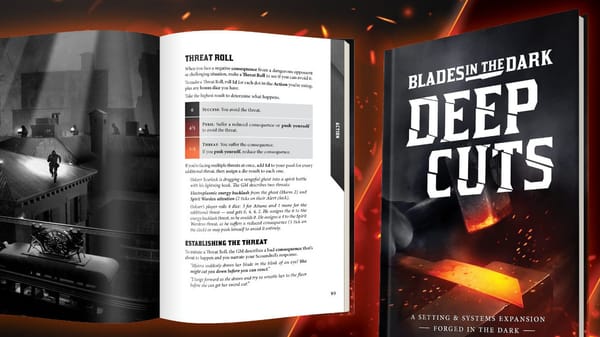The immersive horror of grief
An interview with Dark Dice producer Travis Vengroff about music, character death, and creating a narrative-focused actual play.

Dark Dice, a horror-fantasy D&D actual play podcast, has long been the gold standard of high-production, narrative-focused actual play. When I sat down for an interview with Travis Vengroff about Dark Dice’s guiding philosophy and their recent projects (which include the campaign setting Unnatural Horrors and a full orchestral soundtrack), there was a sense of incongruence between the show and its producer. The thoughtful, kind-eyed, soft-spoken man sitting on the other side of the screen is not who one might expect at the helm of Dark Dice. The show itself is dark, as the title suggests, with faceless demonic antagonists and a tangible threat of death that lingers over every performer; if their character dies on the show, they die in real life. Well, sort of. But we’ll get there.

“I'm sort of a horror guy for people who know me,” said Vengroff. “[When they were going out of business] I bought the entirety of our Blockbuster's horror section for $100, a hundred DVDs. And that was my summer.” Fool & Scholar Productions, Vengroff’s studio with his partner K.A. Statz, primarily creates horror audio dramas such as Liberty; Tales from the Tower and the award-winning The White Vault. While the process of creation might differ from AP to audio drama, Vengroff, Statz, and editor Marisa Ewing-Moody's intention for the final product is the same: to make an immersive, audience-first experience.
Immersion, a nebulous word that has been the bane of many a critic, is mentioned twice in the show’s description, which touts sound design as its tentpole feature: “[Dark Dice] uses immersive soundscapes to create an added layer of immersion.” For the show’s most recent musical endeavor, Vengroff worked with a number of television, film, and video game composers—David Wise, Hitoshi Sakamoto, Austin Wintory, Brandon Boone, Stephen Millen, and Yuzo Koshiro—to create and record a soundtrack with a full orchestra and choir in Budapest. “The intent was to add music that would be emotional, evocative, and also regional,” said Vengroff. “So every song that we have, every composer who works with us, takes a region of the world. And that region has its own unique musical palette within what we do overall.” Each fantasy region correlates to a real life analog, and the language and instruments used reflect the diversity of Dark Dice’s world.

“Then Stephen Millen does the arrangement and puts it all together," said Vengroff. "So it sounds like one soundtrack instead of seven." While this might seem like an overwhelming amount of effort for an actual play, it's standard practice for big-budget shows in other mediums, and in all of them this level of production is done with the audience’s experience in mind. “The music itself is also telling part of the story, giving you more information and lore about what you're experiencing.”
Dark Dice also engages in a traditional media practice that is often considered taboo in the actual play space: ADR, or automatic dialogue replacement. To reduce the length of the episodes, Vengroff replaces periods of play where little narrative progress happens with omniscient narration. “Narratively, that's all about condensing. If the players talked about something, and it wasn't funny or wasn't interesting, I'm going to narrate it and like two sentences will pass ten minutes of the show, which you didn't really need to hear.”
The music itself is also telling part of the story.
In addition to its logistical nature, Vengroff has voice actors perform lines over his original delivery during play, because he believes it offers a better final product. “Some GMs are really amazing at voices. I always feel like I'm not. I have this imposter syndrome, and I also really love the voice actors we work with on our other shows and want an excuse to work with them more.” Vengroff provides the guest actors with “the script notes, which are from the transcripts of what we recorded, edited down, and paired, go out to the talent, and they can get a really great idea of what the scene's gonna be without knowing much.”

The Dark Dice producer wants listeners to feel like they are “in the room or the cave or whatever hellscape we've placed these poor adventurers in, for better or for worse, and to just experience their plight and to also feel what they feel in a grand sense.” In Vengroff’s understanding, this pursuit of immersion offers an opportunity not only to better enjoy the horrors of the story, but to find relief from the seemingly never ending terrors of our world.





